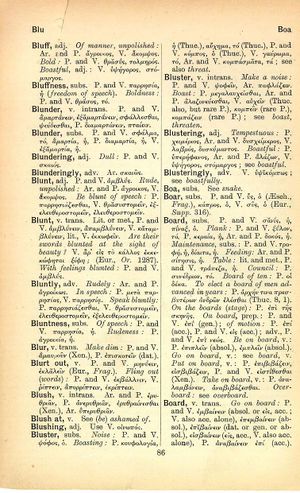blunt: Difference between revisions
From LSJ
πάντες γὰρ οἱ λαβόντες μάχαιραν ἐν μαχαίρῃ ἀπολοῦνται → all they that take the sword shall perish with the sword
m (Woodhouse1 replacement) |
mNo edit summary |
||
| Line 7: | Line 7: | ||
[[rude]], [[unpolished]]: [[Aristophanes|Ar.]] and [[prose|P.]] [[ἄγροικος]], [[verse|V.]] [[ἄκομψος]]. | [[rude]], [[unpolished]]: [[Aristophanes|Ar.]] and [[prose|P.]] [[ἄγροικος]], [[verse|V.]] [[ἄκομψος]]. | ||
[[be blunt of speech]]: [[prose|P.]] [[παρρησιάζεσθαι]], [[verse|V.]] [[θρασυστομεῖν]], [[ἐξελευθεροστομεῖν]], [[ | [[be blunt of speech]]: [[prose|P.]] [[παρρησιάζεσθαι]], [[verse|V.]] [[θρασυστομεῖν]], [[ἐξελευθεροστομεῖν]], [[ἐλευθεροστομεῖν]]. | ||
===verb transitive=== | ===verb transitive=== | ||
Revision as of 17:43, 2 June 2020
English > Greek (Woodhouse)
adjective
rude, unpolished: Ar. and P. ἄγροικος, V. ἄκομψος.
be blunt of speech: P. παρρησιάζεσθαι, V. θρασυστομεῖν, ἐξελευθεροστομεῖν, ἐλευθεροστομεῖν.
verb transitive
Lit. or Met., P. and V. ἀμβλύνειν, ἀπαμβλυνειν, V. καταμβλύνειν, lit., V. ἐκκωφεῖν.
are their swords blunted at the sight of beauty? V. ἆρ' εἰς τὸ κάλλος ἐκκεκώφηται ξίφη; (Eur., Orestes 1287).
with feelings blunted: P. and V. ἀμβλύς.

